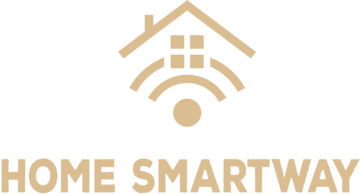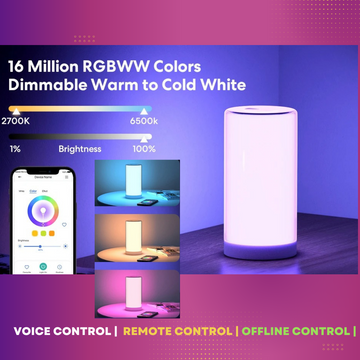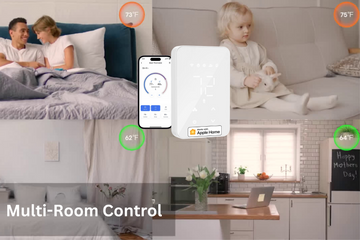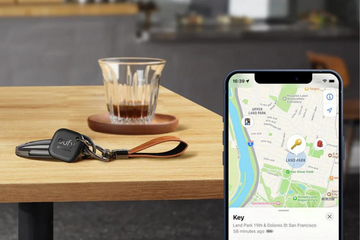What is Matter Smart Home? A Comprehensive Guide to the Matter Smart Home Standard
by Home Smartway Staff Editor on Jan 29, 2024

Confused by smart home compatibility issues? Matter is here to streamline your experience, bridging different devices for smooth interaction. This article breaks down how Matter smart home standards work, why they matter for your household gadgets, and provides a no-nonsense guide to making your devices work together seamlessly—no technical jargon, just straightforward, actionable insights.
Key Takeaways
Matter is an open-source interoperability standard supported by over 550 tech companies designed to ensure compatibility and reliable connections among different manufacturers’ smart home devices, facilitating control via a unified app.
The Connectivity Standards Alliance, which includes industry giants like Amazon, Apple, and Google, oversees the certification of Matter-compliant devices, addressing past interoperability issues and focusing on security and simplified management.
Matter enhances the smart home experience through its interoperability across brands, reliability even without internet connectivity, and streamlined device setup using QR codes for a more user-friendly and flexible ecosystem of smart devices.
Table of Content
Unveiling Matter: The Unifying Smart Home Standard

Beyond a mere name, Matter represents the future of smart home technology. As an open-source interoperability standard, Matter is designed to enhance compatibility among various manufacturers’ smart home devices, allowing them to be controlled by a single app and creating more reliable connections. But Matter is not a solo endeavor. This groundbreaking standard’s development has attracted substantial industry backing, with over 550 tech companies endorsing its potential to revolutionize the smart home ecosystem.
Matter was initially termed Project CHIP (Connected Home over IP), with the goal of enabling IP-based communication across devices. Over time, it has evolved into a progressing initiative aimed at realizing the vision of a seamless smart home.
Matter devices communicate using existing technologies such as:
Bluetooth Low Energy
Ethernet
Wi-Fi
Thread networking protocol
All facilitated by a single global IP-based protocol established with Matter 1.0 specification. This ensures that Matter not only fits into your existing smart home setup but also enhances its functionality and convenience.
Watch the Video
The Role of Connectivity Standards Alliance in Shaping Matter
The Connectivity Standards Alliance (CSA), a significant player, is behind Matter’s development, formerly known as the Zigbee Alliance. The CSA rebranded itself alongside the rebranding of Project Chip to Matter in May 2021. This alliance of tech giants, including Amazon, Apple, and Google, played a pivotal role in accelerating the development of the Matter standard.
The CSA’s mission is to introduce a unifying language for smart home devices and ecosystems. By emphasizing interoperability, security, and simplified management, the CSA has overseen the certification of Matter-compliant devices to ensure compatibility across different ecosystems. This open-source framework addresses past limitations of interoperability seen with protocols like ZigBee 3.0 and Thread, marking a significant leap forward for the smart home industry.
How Matter Elevates Your Smart Home Experience
Matter goes beyond compatibility; it aims to enhance the entire smart home experience. It ensures that devices work seamlessly with major smart home platforms, simplifies device setup, and provides a future-proof seal of approval. But how does it achieve this? Let’s delve deeper into the key aspects of Matter: interoperability across brands, offline reliability, and streamlined device setup.
Interoperability Across Brands
In the world of smart home devices, compatibility is key. Matter aims to dissolve the barriers created by walled gardens in the smart home sector, enabling interoperability among different device brands.
This suggests that devices adhering to the Matter standard can function together, independent of their brand origins. This brings about a new era of flexibility and choice for consumers, where products from a mix of brands and platforms can work together seamlessly to enhance the user experience.
The Matter certification process assures that devices are compatible across multiple brands, simplifying the consumer’s ability to select smart home devices.
Whether it’s smart climate control devices, such as thermostats and air conditioners, or smart home and voice services like Google Assistant, Amazon Alexa, and Apple Siri, Matter’s interoperability ensures that your devices can work in harmony.
This flexibility extends to Matter controllers, which are designed to be platform-agnostic, empowering any Matter controller to manage any Matter-enabled device, regardless of the device’s manufacturer.
Offline Reliability
Picture controlling your smart home devices even during an internet outage - that’s the strength of Matter’s offline reliability. Matter operates on a local network, ensuring swift device response and functionality even when internet connectivity is lost. This means actions such as:
toggling lights
adjusting thermostat settings
locking or unlocking doors
playing music
controlling appliances
occur rapidly and remain unaffected by internet outages.
Furthermore, Thread technology in Matter’s ecosystem supports a self-healing network that maintains inter-device connections, ensuring reliability even when individual devices fail.
With Matter, smart home devices are designed for longevity and continued operation regardless of manufacturer status, offering the flexibility of multi-admin feature for various control points.
Streamlined Device Setup
Although setting up new devices in a smart home can be intimidating, Matter simplifies the process. To pair a Matter-enabled device, a QR code generated by the developer or manufacturer is typically needed.
Applications like the Google Home app streamline this process by scanning the device’s QR code and providing step-by-step in-app instructions. This means adding new accessories to your smart home is as simple as scanning a QR code and following the prompts.
Google’s Home Mobile SDK and Thread Network SDK for Android further facilitate the commissioning of Matter devices within third-party applications. This simplifies the setup process and opens up the possibility of integrating a wide range of Matter-compatible devices into your smart home ecosystem.
Navigating the World of Matter-Compatible Devices

Embracing Matter doesn’t necessitate replacing all your current devices. In fact, many existing devices can be integrated with Matter through software updates and bridge devices, ensuring backward compatibility. Manufacturers can create or update bridges to allow their non-Matter devices to be integrated into the Matter ecosystem.
However, software updates are not universally applicable. The availability of Matter compatibility updates may vary across regions or device models within a brand, making the transition to Matter varied.
The presence of the Matter logo, as well as the use of specific connectivity technologies, can help identify devices that can support or be updated to Matter. Manufacturers such as Ikea and Philips Hue have already announced plans to update compatible products to support Matter, heralding an exciting future for the smart home industry.
"Matter is big tech's answer to smart home device compatibility ... a rare example of big tech companies playing nice"
Integrating Existing Devices with Matter
As Matter solidifies its place as an industry standard, an array of Matter-compatible devices are making their way into the market. Some examples of Matter-compatible devices include:
Appliances
Lighting
Climate control
Security systems
The Matter-compatible ecosystem is diverse and expansive, thanks to the contributions of various matter device manufacturers.
Let’s explore the world of smart lighting solutions, intelligent climate control, and enhanced security with smart locks, all part of the smart devices ecosystem.
Smart Lighting Solutions
Lighting is a crucial aspect of any home, and smart lighting takes it to a new level. Matter supports a variety of smart lighting options such as:
Bulbs
Switches
Smart plugs
Lamps
Outlets
This offers a wide range of choices for consumers. Companies like Nanoleaf offer several lighting products that are Matter-compatible, demonstrating the practical application of this standard in real-world products.
One of the first Matter products in the world to be launched was the smart plugs, now available by Meross
Meross Matter Smart Plug: Where Simplicity, 100% Privacy Security, Flexibility, Compatibility, and Adaptability Converge
Elevate your smart home experience with the MEROSS Matter Smart Mini Wi-Fi Plugs. Effortless setup, robust security, and seamless compatibility with major platforms make these plugs a must-have.
Connect and control your devices effortlessly, enjoying the convenience of local communication and unprecedented interoperability.
Enhance your home automation with MEROSS Matter Smart Mini Wi-Fi Plugs, backed by leading eco-platforms.
Not only does Matter compatibility offer basic controls like on/off, dimming, and color control through any compatible platform, but it also allows for advanced interactions. For example, setting specific color scenes for products like Philips Hue bulbs requires communication with cloud services that can be facilitated via Wi-Fi or a Thread Border Router.
While Matter guarantees core functionality, for additional features such as dynamic lighting scenes and security lighting, users may need to use the specific app provided by the smart lighting company.
Intelligent Climate Control
Matter isn’t just about lighting; it also encompasses intelligent climate control. In this context, supports matter as smart climate control devices, including thermostats such as the Google Nest Thermostat and products like the Midea U air conditioner and Eve Thermo smart radiator valve, enhance energy management and comfort within the smart home.
As part of Matter’s commitment to compatibility, companies like Ecobee have indicated a commitment to the Matter standard, ensuring compatibility for their smart thermostat products. With Matter, smart thermostats can be manually controlled for most functions required for managing home HVAC systems, ensuring a comfortable living environment in your smart home.
Enhanced Security with Smart Locks
Security is a paramount concern in any home, and Matter offers enhanced security with smart locks. Matter ensures the basic function of locking and unlocking for smart locks. While Matter guarantees the core functionality of smart locks, advanced features such as PIN code management may depend on the specific platform in use within the Matter ecosystem, like Apple Home or SmartThings.
The Matter compatibility for smart locks is emerging, with devices like the Aqara U100 supporting the standard, and brands like Level, SwitchBot, and Yale offering smart door locks controllable via a wide range of voice assistants and smart home systems.
Several smart locks, including the Level Lock, Lockly Flex Touch Pro, and Yale Assure Lock series, have announced plans to update their products for compatibility with Matter, ensuring your home’s security is never compromised.
The Future of Matter: Expansion and New Device Categories
Even as Matter is currently revolutionizing the smart home industry, the future promises even greater potential. Upcoming versions of Matter will support new device types such as air purifiers, air quality sensors, and dishwashers, along with enhancements in existing categories to provide more features. The Connectivity Standards Alliance plans bi-annual updates for Matter, with version 1.2 adding new device types, revisions to existing categories, and core improvements to the standard.
Setting Up Your Home Network for Matter
Both Wi-Fi 6 and Thread support the IPv6 protocol, enhancing the network’s ability to handle a substantial number of smart home devices without running out of IP addresses.
Thread border routers play an indispensable role by connecting Thread devices to the internet and facilitate the formation of a resilient Thread mesh network, which is reinforced by powered devices within it. Having one Thread border router is necessary for a home network, but additional routers can be incorporated to improve the robustness and reliability of the Thread network.
Matter Controllers and Their Role in Your Smart Home

Your smart home ecosystem relies heavily on Matter controllers. These crucial devices built into smart speakers and hubs onboard other devices to your home network, manage communications, control devices, and facilitate remote access when enabled. Examples of current Matter controllers include:
Apple HomePod and Apple TV for Apple Home
Google Nest Hub
Amazon Echo devices
Samsung SmartThings Hub and Smart TVs
Certain Wi-Fi routers that support the protocol
Matter controllers:
Enable direct communication between devices over Wi-Fi or Thread without a central hub
Manage existing devices within the Matter ecosystem
Are central to setting up routines and automations
Apple HomePod and Apple TV for Apple Home
Google Nest Hub
Amazon Echo devices
Samsung SmartThings Hub and Smart TVs
Certain Wi-Fi routers that support the protocol
This means that with a Matter controller, you have full control over your smart home ecosystem, ensuring a seamless and efficient user experience.
Watch the Video
The Significance of Cloud Services in the Matter Ecosystem
Cloud services are essential in expanding the capabilities of Matter devices. They provide advanced features and custom settings that would otherwise be beyond the capabilities of the devices themselves. Complex functions and operations within the Matter ecosystem often rely on cloud services, guiding the future development of the Matter specification.
While cloud services offer enhanced functionality, Matter’s privacy principles dictate that data sharing should be minimized and have clear purposes, which is especially important when integrating with cloud services. Matter incorporates strong encryption and authentication practices to guard against data leaks and cyber-attacks, ensuring safe and secure cloud connectivity. Thread technology features encrypted communication and authentication to ensure secure cloud connectivity.
Although basic control of Matter devices must be possible locally, cloud services are permitted for certain cases to enhance device functionality.
Challenges and Considerations When Adopting Matter
Although basic control of Matter devices must be possible locally, cloud services are permitted for certain cases to enhance device functionality.
Some challenges and considerations include:
Some older smart home devices may require a firmware update to become compatible with Matter.
Some devices may lack the necessary flash memory and technical specificity to support the Matter protocol.
Users may encounter interoperability issues arising from existing protocols such as ZigBee, Bluetooth, and Wi-Fi, making the transition to Matter challenging.
The progressive development of Matter has led to initial delays in rolling out certified hardware products, necessitating ongoing attention to security, privacy protection, and performance improvements. Manufacturers have the responsibility to offer over-the-air firmware updates to devices for Matter compliance, while users must actively stay informed about the support and capabilities of Matter devices.
Despite these challenges, the benefits of Matter far outweigh the initial hurdles, offering a smart home experience that is truly seamless, reliable, and user-friendly.
Summary
In summary, Matter is revolutionizing the smart home industry, offering a unifying standard that enhances compatibility, simplifies setup, and improves security and reliability. With the ability to integrate with a wide range of devices and platforms, Matter is dissolving the barriers of the smart home sector, promoting interoperability, and paving the way for a seamless smart home experience.
While there are challenges and considerations in adopting Matter, the benefits it brings to the table are undeniable. As we step into the future, Matter is set to redefine our perception of a smart home, taking us closer to a world where every device is interconnected, intelligent, and incredibly intuitive.
Frequently Asked Questions
What is Matter in a smart home?
Matter is an open-source standard for smart home technology that aims to simplify the smart home ecosystem by allowing internet-connected devices from different manufacturers to communicate simply and securely.
Who owns Matter smart home?
Matter smart home is maintained by the Connectivity Standards Alliance, which is an alliance of companies providing a proprietary standard for home automation that is royalty-free.
Is Matter better than Zigbee?
It really depends on your needs and preferences. If interoperability and security are top priorities for you, then Matter may be the better option. On the other hand, if you already have a Zigbee network set up and are happy with the devices available, then there may be no need to switch to Matter.
Does HomeKit work with Matter?
No, HomeKit does not work directly with Matter. You need a bridge like the Starling Home Hub to connect Matter devices to Apple Home.
How does Matter improve the smart home experience?
Matter improves the smart home experience by ensuring compatibility with major platforms, simplifying device setup, and providing a future-proof seal of approval. This makes it easier for devices to work together seamlessly, enhancing the overall convenience and functionality of the smart home.








